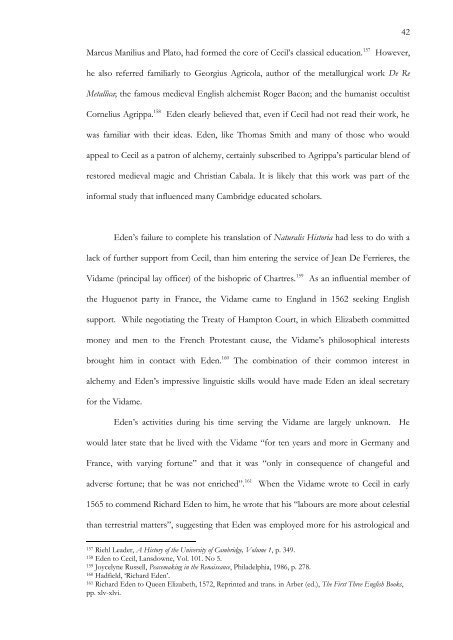The Alchemical Patronage of Sir William Cecil, Lord Burghley
The Alchemical Patronage of Sir William Cecil, Lord Burghley
The Alchemical Patronage of Sir William Cecil, Lord Burghley
Create successful ePaper yourself
Turn your PDF publications into a flip-book with our unique Google optimized e-Paper software.
Marcus Manilius and Plato, had formed the core <strong>of</strong> <strong>Cecil</strong>‘s classical education. 157 However,<br />
he also referred familiarly to Georgius Agricola, author <strong>of</strong> the metallurgical work De Re<br />
Metallica; the famous medieval English alchemist Roger Bacon; and the humanist occultist<br />
Cornelius Agrippa. 158 Eden clearly believed that, even if <strong>Cecil</strong> had not read their work, he<br />
was familiar with their ideas. Eden, like Thomas Smith and many <strong>of</strong> those who would<br />
appeal to <strong>Cecil</strong> as a patron <strong>of</strong> alchemy, certainly subscribed to Agrippa‘s particular blend <strong>of</strong><br />
restored medieval magic and Christian Cabala. It is likely that this work was part <strong>of</strong> the<br />
informal study that influenced many Cambridge educated scholars.<br />
Eden‘s failure to complete his translation <strong>of</strong> Naturalis Historia had less to do with a<br />
lack <strong>of</strong> further support from <strong>Cecil</strong>, than him entering the service <strong>of</strong> Jean De Ferrieres, the<br />
Vidame (principal lay <strong>of</strong>ficer) <strong>of</strong> the bishopric <strong>of</strong> Chartres. 159 As an influential member <strong>of</strong><br />
the Huguenot party in France, the Vidame came to England in 1562 seeking English<br />
support. While negotiating the Treaty <strong>of</strong> Hampton Court, in which Elizabeth committed<br />
money and men to the French Protestant cause, the Vidame‘s philosophical interests<br />
brought him in contact with Eden. 160 <strong>The</strong> combination <strong>of</strong> their common interest in<br />
alchemy and Eden‘s impressive linguistic skills would have made Eden an ideal secretary<br />
for the Vidame.<br />
Eden‘s activities during his time serving the Vidame are largely unknown. He<br />
would later state that he lived with the Vidame ―for ten years and more in Germany and<br />
France, with varying fortune‖ and that it was ―only in consequence <strong>of</strong> changeful and<br />
adverse fortune; that he was not enriched‖. 161 When the Vidame wrote to <strong>Cecil</strong> in early<br />
1565 to commend Richard Eden to him, he wrote that his ―labours are more about celestial<br />
than terrestrial matters‖, suggesting that Eden was employed more for his astrological and<br />
157 Riehl Leader, A History <strong>of</strong> the University <strong>of</strong> Cambridge, Volume 1, p. 349.<br />
158 Eden to <strong>Cecil</strong>, Lansdowne, Vol. 101. No 5.<br />
159 Joycelyne Russell, Peacemaking in the Renaissance, Philadelphia, 1986, p. 278.<br />
160 Hadfield, ‗Richard Eden‘.<br />
161 Richard Eden to Queen Elizabeth, 1572, Reprinted and trans. in Arber (ed.), <strong>The</strong> First Three English Books,<br />
pp. xlv-xlvi.<br />
42















